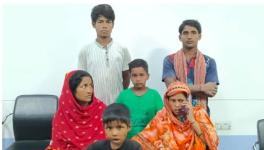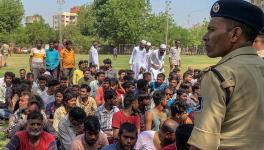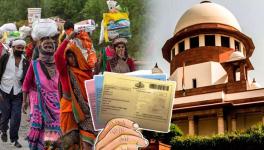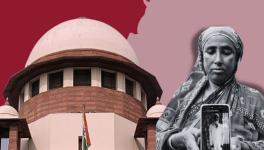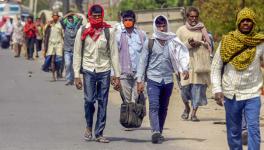Citizenship as Public Good
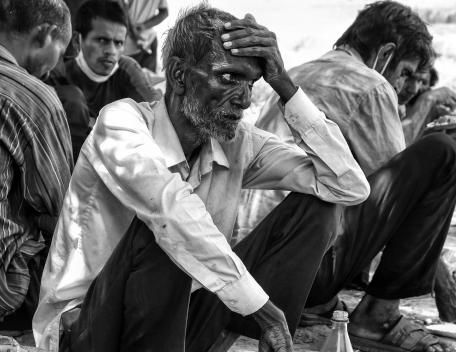
Image Courtesy Sandeep Yadav | India Exclusion Report 2019-20
The India Exclusion Report 2019-2020, jointly produced by Centre for Equity Studies and Three Essays Collective, carries in depth studies on various aspects of socio-economic exclusion in India. The chapters in the report have been authored by scholars, researchers and practitioners. As Harsh Mander, activist, writer and director of CES explains, “the central premise of the Exclusion Report series is that it is the central duty of any democratic State to ensure equitable access to every person, including the most vulnerable, to all public goods.”
The first part of the report contains in-depth research on certain selected vulnerable categories of people such as migrant workers, urban Indian Muslims, sex workers from different cities in India and sewage workers. The second part of the report throws light on exclusion from four selected public goods citizenship, early childhood care and education, public employment and the protection of labour wages. The following is an excerpt from the chapter “Citizenship and the Mass Production of Statelessness.”
The entire report is available on the Centre for Equity Studies website here.
Citizenship as a Public Good
The India Exclusion Reports (IXRs) define exclusion as processes created by the state that proliferate, tolerate or deepen barriers for individuals and groups for accessing public goods. They define a public good as ‘a good, service, attainment, capability or freedom—individual or collective—that is essential for every human being to be able to live a life of dignity.’ Threats to citizenship engendered by bureaucratic and legal processes have a subtle yet profound implication for exclusion within this meaning.
Citizenship is best understood as a multidimensional concept. From a legal standpoint, citizenship is a guarantee of political status and rights. In modern polities, citizens have secure membership in the constitutional community. This usually means that the State provides them, at least theoretically, the widest legally available bundle of civil, political and socio-economic rights. Scholars have often conceptualized citizenship in terms of this guaranteed bundle of rights. For instance, they have suggested that there could be civil citizenship that guarantees equal protection of the law and basic individual rights, political citizenship that guarantees political rights like voting, and social citizenship that guarantees all members basic standards of living (Marshall, 1963).
Modern democratic states also associate citizenship with guarantees of political participation, like the right to vote. Citizens are legally entitled to participate in ongoing democratic deliberations and policy-formation. At the same time, a citizen is not only rights-bearing, but also duties-bearing. Modern polities expect their citizens, often through the instrumentalities of law, to contribute to collective political life.
Obviously, an individual having citizenship status does not always mean that she will de facto benefit from everything that is legally guaranteed. But it does mean that she has an institutionally viable claim to demand what is legally guaranteed (Somers, 1994). In this sense, another way to conceptualize citizenship is to think of it as the guarantee to the widest institutional access to make claims from the State and community at large.
Beyond legality, citizenship is also a mark of belonging. States lay down rules of citizenship, demarcating its qualifications and disqualifications. Thus, citizenship rules reflect how a political community understands its normative foundations. For instance, if a country provides citizenship to every person born in it (often described as jus soli or birthright citizenship), we can assume that it has adopted a territorial conception of national belonging.
This multidimensional conceptualization of citizenship allows us to think about the relationship between citizenship and public goods, and the variety of ways in which exclusion can happen in relation to citizenship.
At the first level, barriers to citizenship status and its exercise amount to exclusion in an instrumental sense. Citizenship status facilitates the enjoyment of other public goods through the provision of rights and entitlements. If the State violates, or fails to fulfil or perform its obligations, citizenship allows for institutional access, participation and redress. Thus, citizenship is a meta public good since citizenship status allows individuals and groups to exercise most other functionalities within the meaning adopted by the IXRs. Consequently, actual denial or deprivation of citizenship results in exclusion from public goods.
The State’s denial or deprivation of citizenship amounts to exclusion in a non-instrumental sense as well. Citizenship status forms an important aspect of what political philosopher John Rawls calls the ‘social bases of self-respect’. In his view, a just political system must guarantee self-respect or self-esteem of individuals because this element of dignity is central for a person to lead a good life. For Rawls, this can only be done if the just society guarantees equal citizenship to everyone, as a recognition of everyone’s status as an equally dignified person (Rawls, 1999, p. 386).1 Martha Nussbaum subsequently included ‘social bases of self-respect’ in her list of core capabilities (Nussbaum, 2011, p. 34). Citizenship encapsulates the mutual recognition among the members of the community that each of them equally belongs to the community, and thus deserves equal respect. Denial or deprivation of citizenship is essentially a declaration that the individual’s claim that she deserves respect as an equal member of the community is being rejected. Thus, citizenship is also a public good in a non-instrumental sense because it is a capability, within the meaning adopted by the IXRs, for people to live a life of dignity.
Hannah Arendt has articulated another compelling variation of the relationship between citizenship and human dignity. According to Arendt, human dignity is possible only when a person is a member of a political community. Human dignity is the result of other members of the polity recognizing the individual’s status and ability to be a free agent. Consequently, for Arendt, when any person is bereft of citizenship, she is stripped of humanity itself. This led her to lament that without ‘the right to have rights’—the right to be part of some political community as a citizen—human dignity could not be guaranteed for everyone (1973, pp. 296– 299). International law recognizes this centrality of citizenship as a human right, as indicated by Article 15 of the Universal Declaration of Human Rights that declares that everyone has a right to nationality, and no one can be arbitrarily deprived of her nationality. In this sense, denial and deprivation of citizenship is a profound exclusion because it may render a person stateless and without any political membership, and thus compromise her dignity altogether.
The appreciation of citizenship as a public good reveals that the State must secure the guarantee of status through legal and institutional means. It must not subject a person’s citizenship status to arbitrary targeting. It must also create a transparent legal architecture in case the issue of citizenship verification and authentication arises. It also follows that a person must not be subjected to arbitrary and overly demanding enquiries about their citizenship status. Arbitrary questioning of someone’s citizenship— particularly in the absence of transparent, fair and reasonable institutional procedures—would introduce severe uncertainty in her life, especially considering the serious consequences of the loss of citizenship. Legal processes can make citizenship precarious by making it contingent on arbitrary official discretion and whim. Precarious citizens are compelled to invest all their human and material resources to preserving their status, and this diverts them from achieving any other public good. Thus, processes that engender precarious citizenship suspend normal lives altogether. Thus, exclusion from citizenship as a public good is triggered not only when a person is de jure (or even de facto) denied or deprived of citizenship. It is also triggered when citizenship status is threatened by unfair and arbitrary procedures. They amount to indirect exclusion by creating a heightened form of vulnerability. Precarious citizenship is exclusion because it undermines the security of status, which is an important basis of self-respect.
It follows that exclusion in relation to citizenship can be of three kinds. First, there can be a de jure exclusion resulting from the withdrawal of citizenship that makes access to public goods contingent on citizenship status. Second, there can be a de facto exclusion as the indignity of citizenship deprivation, resulting from denials of public goods and the withdrawal of membership to political communities. And third, there is what the IXRs describe as adverse inclusion. In the context of the public good of citizenship, adverse inclusion results not from a de facto or de jure withdrawal of citizenship, but from unstable citizenship that undermines meaningful opportunity and access to all public goods.
Arendt, Hannah (1973). The Origins of Totalitarianism. New York: Harvest, pp. 296– 299.
Marshall, T. H. (1963). Citizenship and socialclass. In Sociology at the Crossroads. London: Heinemann, pp. 67–127.
Nussbaum, M. C. (2011). Creating Capabilities. Cambridge: Harvard University Press
Rawls, John (1999). A Theory of Justice (Revised edition). Cembridge: Harvard University Press.
Somers, M. R. (1994). Rights, relationality, and membership: rethinking the making and meaning of citizenship. Law & Social Inquiry, 19(1), 63–112.
Courtesy: Indian Cultural Forum
Get the latest reports & analysis with people's perspective on Protests, movements & deep analytical videos, discussions of the current affairs in your Telegram app. Subscribe to NewsClick's Telegram channel & get Real-Time updates on stories, as they get published on our website.









